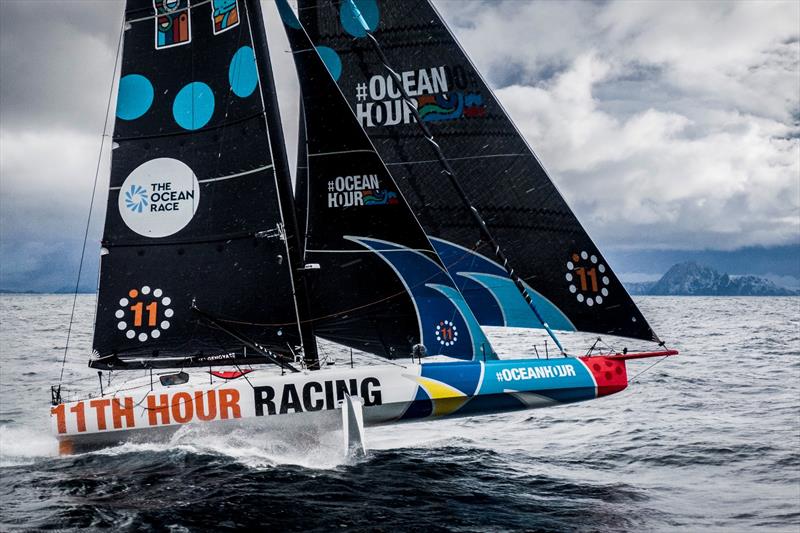
eDNA data collection in The Ocean Race could provide crucial insights on ocean biodiversity
by The Ocean Race 16 Sep 2023 14:54 UTC

The Ocean Race 2022-23 - 28 March 2023, 11th Hour Racing Team crossing Cape Horn on Leg 3, day 30 © Amory Ross / 11th Hour Racing / The Ocean Race
Environmental DNA, known as eDNA, one of the most cutting-edge ways to measure ocean health and biodiversity, was collected during The Ocean Race 2022-23 in a world first for racing boats.
- In a first-of-its-kind data collection for racing boats, environmental DNA was gathered during a leg of the round-the-world sailing Race
- Scientists found a link between latitude and the abundance of ocean bacteria that break down plastic
11th Hour Racing Team, winners of the six-month long sailing regatta, took samples during leg 4 of the Race, 5,550-nautical miles from Itajai, Brazil to Newport, Rhode Island, USA, in a pioneering initiative of The Ocean Race's Science programme, which aims to support understanding about the state of the seas.
27 water samples were gathered between 23rd April 2023 and 10th May 2023, and later analysed by the Cawthron Institute, New Zealand's largest independent science organisation. Each sample included genetic material contained in microbes or shed by thousands of marine species through their waste products and skin cells. Analysis of this eDNA gives a comprehensive snapshot of the presence and diversity of these species with high accuracy. These data are valuable for a number of reasons, including helping to track endangered species, monitoring diseases and pathogens and, when samples are compared over time, eDNA can provide insights into how the climate crisis is affecting marine life, for example, by shifting their geographic range.
Among the key findings of The Ocean Race eDNA collection was a striking correlation between the abundance of ocean bacteria (Pseudomonas and Acidobacter) that break down plastic and latitude, with analysis showing the highest levels of the bacteria (meaning greater plastic degradation) at lower latitudes near Brazil's coastline. While data from a single boat means that findings aren't conclusive, this discovery highlights the powerful role of this type of eDNA technology and the need for further research. Understanding more about the geographic spread of these bacteria could provide valuable insights to help fight the marine plastic crisis.
Analysis also found that parasitic bacteria (exo or intracellular parasites), which can be a threat to the health of other species, including humans, are strongly linked with increased sea surface temperature and longitude, with higher abundances closer to landmasses. With record-breaking ocean temperatures documented in recent months, the influence of changing ocean temperatures on pathogenic microorganisms is another crucial area requiring further research.
Xavier Pochon, Team Leader, Molecular Surveillance, Cawthron Institute and Associate Professor, University of Auckland, said: "We're very excited about the data collected during The Ocean Race, particularly those linked with pathogens and plastic degraders. These are interesting findings because very little is known about their distribution and ecology across large latitudinal gradients.
"Our eDNA collection system on racing boats offers significant benefits over traditional research methods as it allows scientists to audit biodiversity from across the tree of life, more rapidly, cheaply and with minimum hands-on time for the sailors. We are looking forward to equipping many more racing boats in the future and propelling our knowledge of marine life into uncharted waters".
As part of The Ocean Race's Science programme - one of the pillars of the Racing with Purpose sustainability programme that was created with Premier Partner 11th Hour Racing - the data collection was trialled across one leg of the 32,000 nautical mile (60,000 km) Race (spanning a latitude of 27 degrees to 39 degrees) to test the feasibility of gathering eDNA on racing boats.
11th Hour Racing Team gathered the samples through an onboard OceanPack; a specialised instrument that measures a range of ocean data, including salinity, temperature, carbon dioxide, oxygen and trace elements. The equipment worked automatically and continuously throughout the Race. eDNA was sampled through the OceanPack - the vessel's existing seawater flow-through system - which pumps two litres of water through innovative eDNA filters for later lab analysis. Trialling eDNA sampling via the OceanPack had the advantage of providing scientists with the opportunity to cross check data and look for links and correlations.
Stefan Raimund, Ocean Advisor at The Ocean Race said: "Each sample collected contained millions of pieces of eDNA, from single-cell organisms, all the way up to lantern fish and the elusive Moray eel, providing a fascinating snapshot of life below the waves and how it changes throughout the Atlantic Ocean. eDNA sampling is at the forefront of biodiversity testing and is a powerful tool for understanding ocean health and how the major threats of climate change and pollution affect it. The more we know about the ocean, the more effectively we can protect it.
"Having successfully trialled the sampling during The Ocean Race 2022-23, we hope to scale it up for future races and have more boats collecting this data, including in remote and vital parts of the ocean, where even less information is available for scientists."
The potential of eDNA testing for understanding marine biodiversity has been increasingly lauded in the last few years for providing a holistic view of biodiversity without the drawbacks of traditional research methods like catching species and aerial surveys, which can be harmful, expensive and limited. eDNA can also provide fast results, which can be vital given the urgency of the problems impacting the seas.
The data were produced using IlluminaTM next generation sequencing technology. Cawthron Institute, who specialise in science that supports the environment and sustainable development, was also supported by Sequench ltd, and Smith-Root.